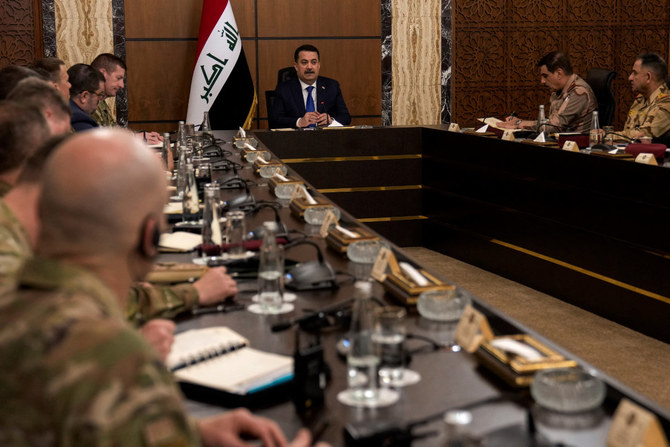Maria Maalouf
Next week’s visit to the US by Iraqi Prime Minister Mohammed Shia Al-Sudani will take place in a very complex regional context. Israel’s ongoing military operations in the Gaza Strip have been exploited by pro-Iranian militias to carry out armed attacks against American military bases in Iraq and Syria.
Meanwhile, the US wants to strengthen the capabilities of its partners in the region to confront terrorist organizations. This comes at a time when Washington is seeking to transform its military role in the Middle East, within the framework of focusing on the most potent threats to America’s security and its interests in the international arena.
Several issues will be on the agenda on Monday, when the Iraqi PM holds his first meeting at the White House since he assumed power in October 2022. He will meet US President Joe Biden and many American officials. US Ambassador to Iraq Alina Romanowski said in an interview with Reuters last month that Daesh still poses a threat to the security and stability of the Iraqi state and that the mission of the military coalition led by the US to rout the group is not yet over. Therefore, Washington is focusing on building Iraq’s security capabilities to ensure the permanent defeat of Daesh and allow it to confront future terrorist threats. Since 2012, the US Congress has allocated more than $2 billion of Foreign Military Financing to build Iraqi security capabilities.
However, in January, Al-Sudani stated that the justification for the presence of the US-led coalition in Iraq had come to an end and that there was a need for dialogue with Washington to set a timetable for ending the mission of combating Daesh in Iraq. With the increase in American military strikes against armed militias in the country in response to the attacks on its bases since Oct. 7, pressure has increased on Al-Sudani to remove US troops from Iraq. This is despite the fact that their mission is today limited to providing support and training to Iraqi forces to enhance their capabilities to prevent the return of Daesh and protecting the Iraqi state against the threats of other terrorist organizations.
The US administration opposes any unplanned withdrawal from Iraq, as it fears a complete withdrawal may lead to the return of Daesh, in addition to making Iraq even more of an arena for Iranian influence, thus wasting the efforts that America has made in Iraq over the past two decades. With the increase in armed operations by pro-Iranian Iraqi militias against American military bases in Iraq and Syria, Washington has, in recent months, urged Baghdad to make more efforts to prevent such attacks. The US administration has called for Iraq to increase security around all military bases that host American forces, prevent the militias from obtaining advanced weaponry, prosecute those who have carried out attacks against American bases and installations in Iraq, and respect the pledge it made to guarantee the security of American diplomatic and military facilities in the country.
The Biden administration also seeks to prevent Iran from using the Iraqi financial system to circumvent US sanctions. Therefore, it restricts Iraq’s access to its funds in America in an attempt to eliminate money laundering, which many trends indicate benefits both Iran and Syria. The US Federal Reserve imposes strict restrictions on international dollar transfers to Iraqi commercial banks.
Washington has also called on Baghdad to reform its financial system to prevent Iran from benefiting from it. Among the most prominent required reforms are improving the oversight of monetary transfers, preventing the financing of Iranian-backed militias and enhancing transparency in the economic system. The Iraqi government has pledged to implement these reforms but little progress has been made so far. The US is pressuring the Baghdad government to act as soon as possible.
The multiple visits exchanged between American and Iraqi officials reveal that Iraq is still a priority in US foreign policy and that it is the cornerstone of regional stability. The Biden administration is focusing on consolidating relations with Baghdad and moving their bilateral relations into a permanent strategic security partnership, as Iraq remains one of the most essential battlefields against terrorism. America’s search for a stable strategic partnership with Iraq comes within the framework of its policy to limit Iranian influence, which Washington sees as one of the key threats to its strategic interests in the region.
Arab News







